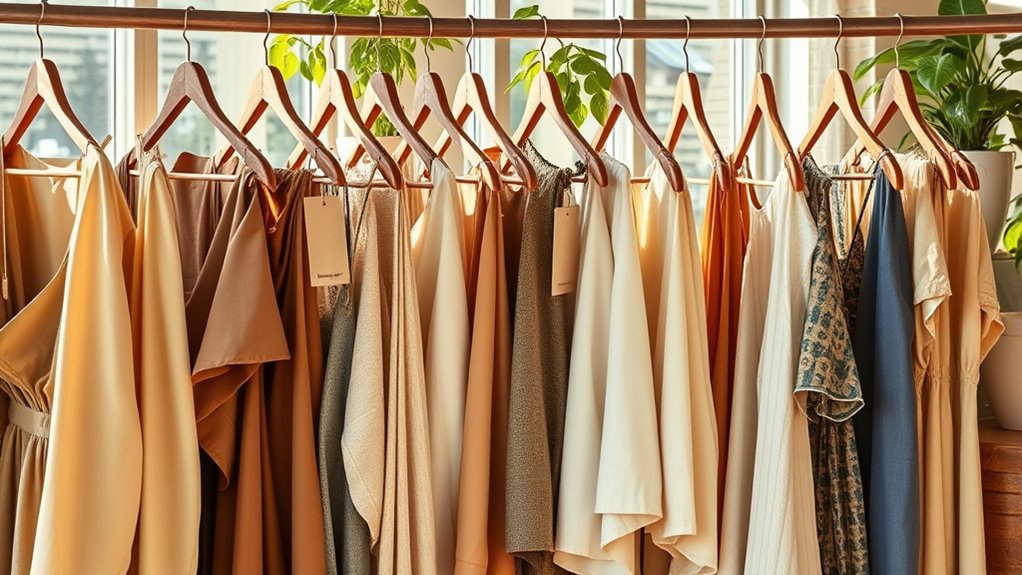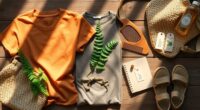If you’re looking for top sustainable fashion brands, check out Stella McCartney, known for luxury designs with eco-friendly materials, and Patagonia, committed to environmental responsibility. Organic Basics offers high-quality organic materials, while Pangaia merges fashion with innovative science. Thought emphasizes timeless pieces made from sustainable resources, and Tomorrow Denim revolutionizes denim production using recycled materials. Explore these brands to find fashion that aligns with your values and stay tuned for more insights on sustainability in style.
Key Takeaways
- Patagonia is renowned for its commitment to environmental responsibility and transparency in production practices.
- People Tree pioneers Fair Trade fashion, collaborating with artisans in developing countries to promote ethical practices.
- Stella McCartney merges luxury fashion with eco-friendly materials, setting a standard in sustainable luxury.
- Veja combines ecological and fair trade practices, significantly reducing their environmental impact in footwear.
- Girlfriend Collective transforms recycled plastic bottles into stylish activewear, emphasizing sustainability in fashion.

As the fashion industry grapples with its environmental impact, sustainable fashion brands are stepping up to make a difference. You might be surprised by how many innovative companies are out there, blending style with ethics. For instance, Organic Basics focuses on high-quality, organic materials that feel good and last longer.
Then there’s Stella McCartney, who showcases luxury designs while incorporating eco-friendly materials, proving that sustainability can be chic.
When it comes to innovation, Pangaia stands out. They’re not just about fashion; they’re about science, developing groundbreaking materials that redefine what clothing can be.
Tomorrow Denim takes this a step further by revolutionizing denim production using recycled materials and water-saving techniques, guaranteeing you can rock your favorite jeans guilt-free.
Brands like Thought utilize sustainable materials such as bamboo and hemp to create timeless pieces that contribute to a more sustainable wardrobe.
Ethics play a significant role in sustainable fashion too. People Tree has pioneered Fair Trade fashion, collaborating with artisans in developing countries to secure fair wages and ethical labor practices.
Everlane takes transparency to the next level by revealing details about their manufacturing processes and guaranteeing ethical labor worldwide.
Nisolo emphasizes fair wages for artisans, while ABLE empowers women in vulnerable communities through job opportunities.
With Brøgger, you can feel good knowing your fashion choices align with ethical production methods.
Environmental impact reduction is another cornerstone of sustainable fashion. Patagonia leads the way with its commitment to environmental responsibility in all production aspects.
Allbirds focuses on reducing its carbon footprint, using sustainable materials to create comfortable shoes.
Girlfriend Collective transforms recycled plastic bottles into stylish activewear, minimizing waste.
Sézane adopts zero-waste production processes, while Veja combines ecological and fair trade practices to lower environmental impact.
Transparency in supply chains is essential, and brands like Everlane and Sézane set benchmarks for honesty in their practices.
They provide insights into their manufacturing processes, guaranteeing ethical standards.
Thought also guarantees eco-friendly sourcing and sustainable supply chain management, solidifying its commitment to sustainability.
Finally, sustainable fashion trends encourage you to invest in timeless designs over fast fashion.
Brands like Sézane and Thought prioritize longevity in clothing, while Kotn offers high-quality basics that emphasize quality over quantity.
Frequently Asked Questions
How Can I Tell if a Brand Is Truly Sustainable?
To tell if a brand is truly sustainable, start by checking their materials and sourcing practices. Look for eco-friendly fabrics like organic cotton or recycled materials.
Investigate their production practices—ensure they promote fair labor and transparency. Evaluate their commitment to reducing waste and using renewable energy.
Finally, see if they engage with consumers on sustainability issues and provide educational content. If they meet these criteria, you can feel more confident in their sustainability claims.
What Materials Are Considered Sustainable in Fashion?
When you choose a brand that uses organic cotton, like a hypothetical company sourcing its cotton from certified farms, you’re supporting sustainable practices.
Sustainable materials in fashion include organic cotton, recycled polyester, hemp, and bamboo, all of which minimize environmental impact.
You’ll also find innovative options like Tencel and Piñatex, which offer eco-friendly alternatives to conventional fabrics.
Are Sustainable Fashion Brands More Expensive Than Traditional Ones?
Yes, sustainable fashion brands are generally more expensive than traditional ones.
This difference comes from using eco-friendly materials, ethical labor practices, and high-quality production processes.
While you might pay more upfront, these garments are designed to last longer, which can save you money in the long run.
Additionally, investing in sustainable fashion supports ethical practices and reduces environmental impact, making it a worthwhile choice for conscientious consumers like you.
Can Sustainable Fashion Be Stylish and Trendy?
Absolutely, sustainable fashion can be stylish and trendy!
You’ll find that many brands prioritize both aesthetics and eco-friendliness. With innovative designs and high-quality materials, they create pieces that not only look great but also align with your values.
From chic swimwear to fashionable everyday clothing, you’ve got plenty of options. Embracing sustainability doesn’t mean compromising on style; rather, it enhances your wardrobe with unique and responsible choices that stand out.
How Can I Support Sustainable Fashion Beyond Buying Clothes?
Supporting sustainable fashion‘s like nurturing a garden; it thrives with care and attention.
Beyond buying clothes, you can advocate for local artisans and promote slow fashion by sharing your knowledge with others.
Attend sustainable fashion events to raise awareness and engage in activism that pushes for transparency and ethical labor practices.
You can also monitor brand ratings and provide feedback, encouraging brands to improve their sustainability practices over time.
Conclusion
So, if you’re still clinging to fast fashion like it’s a lifeline, maybe it’s time for a wardrobe intervention. Embrace these sustainable brands that actually care about the planet—because really, who needs a closet full of cheap, throwaway clothes when you can strut your stuff in eco-friendly style? Remember, it’s not just about looking good; it’s about saving the world one fabulous outfit at a time. Now, go forth and shop responsibly, you eco-warrior!










